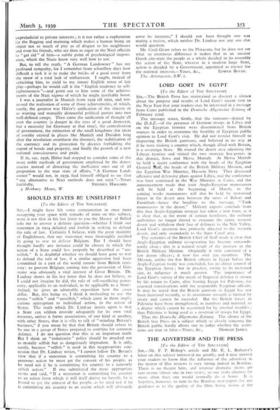SHOULD STATES BE UNSELFISH ?
[To the Editor of THE SPECTATOR] SIR,—I might have felt some compunction in once more occupying your space with remarks of mine on this subject, were it not that in his last letter to you the Master of Balliol asks me to answer a definite question—whether I think our statesmen in 1914 deluded and foolish in seeking to defend the rule of law. Certainly I believe, with the great majority of Englishmen, that our statesmen were thoroughly justified in going to war to deliver Belgium. But I should have thought hardly any instance could be chosen in which the action of a State could less properly be described as " un- selfish." It is doubtful whether we should have gone to war to defend the rule of law, if a similar aggression had been committed in a part of the world remote from British terri- tory : to prevent Belgium coming into the possession of Ger- many was obviously a vital interest of Great Britain. Dr. Lindsay shows in his last letter that he does not believe, as I could not imagine he did, the rule of self-sacrificing gener- osity, applicable to an individual, to be applicable to a State : indeed, he gives an admirable exposition how the cases differ. But, this being so, I think it misleading to use the terms " selfish " and " unselfish," which carry in them impli- cations appropriate to individual action, to the action of States. The truth which Dr. Lindsay insists upon is that a State can seldom provide adequately for its own vital interests, unless it forms associations, of one kind or another, with other States, that it is silly to talk of " minding Britain's business," if you mean by that that Britain should refuse to be one in a group of States prepared to combine for common defence. I do not question that this is an important truth. But I think an " isolationist " policy should be attacked not as morally selfish but as dangerously imprudent. It is only, surely, because " selfish " is used in this inappropriate con- nexion that Dr. Lindsay writes, " I cannot follow Dr. Bevan's view that if a statesman is committing his country to a generous action he must get the consent of his people, as he need not if he is committing his country to a narrowly
selfish action." If one substituted the more appropriate terms and said, " If a statesman is committing his country to an action from which it will itself derive no benefit, he is bound to get the consent of his people, as he need not if he is committing Ais country to an action which will obviously
serve its interests," I should not have thought one was stating a truism, which neither Dr. Lindsay nor any one else would question.
Mr. Cecil Grant refers to the Plataeans, but he does not see what an enormous difference it makes that in an ancient Greek city-state the people as a whole decided in its assembly the action of the State, whereas in a modern large State, action is decided by a Government, appointed as trustee for
the national interests.—Yours, &c., EDWYN BEVAN. The Athenaeum, S.W. i.


























































 Previous page
Previous page